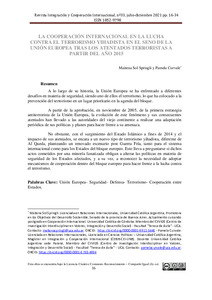Por favor, use este identificador para citar o enlazar este ítem:
https://repositorio.uca.edu.ar/handle/123456789/11937| Campo DC | Valor | Lengua/Idioma |
|---|---|---|
| dc.contributor.author | Springli, Maitena Sol | es |
| dc.contributor.author | Curvale, Pamela Soledad | es |
| dc.date.accessioned | 2021-07-23T23:46:27Z | - |
| dc.date.available | 2021-07-23T23:46:27Z | - |
| dc.date.issued | 2021 | - |
| dc.identifier.citation | Springli, M.S., Curvale, P.S. La cooperación internacional en la lucha contra el terrorismo yihadista en el seno de la Unión Europea tras los atentados terroristas a partir del año 2015 [en línea]. Revista Integración y Cooperación Internacional. 2021, 33 Disponible en: | es |
| dc.identifier.issn | 1852-9798 | - |
| dc.identifier.uri | https://repositorio.uca.edu.ar/handle/123456789/11937 | - |
| dc.description.abstract | Resumen: A lo largo de su historia, la Unión Europea se ha enfrentado a diferentes desafíos en materia de seguridad, siendo uno de ellos el terrorismo, lo que ha colocado a la prevención del terrorismo en un lugar prioritario en la agenda del bloque. A partir de la aprobación, en noviembre de 2005, de la primera estrategia antiterrorista de la Unión Europea, la evolución de este fenómeno y sus consecuentes atentados han llevado a las autoridades del viejo continente a realizar una adaptación periódica de sus políticas y planes para hacer frente a su amenaza. No obstante, con el surgimiento del Estado Islámico a fines de 2014 y el impacto de sus atentados, se encara a un nuevo tipo de terrorismo yihadista, diferente de Al Qaeda, planteando un renovado escenario post Guerra Fría, tanto para el sistema internacional como para los Estados del bloque europeo. Esto lleva a preguntarse si dichos actos cometidos por una minoría fanatizada obligan a alterar las políticas en materia de seguridad de los Estados afectados, y a su vez, a reconocer la necesidad de adoptar mecanismos de cooperación dentro del bloque europeo para hacer frente a la lucha contra el terrorismo. | es |
| dc.description.abstract | Abstract: Throughout its history, the European Union has faced various security challenges, one of them being terrorism, which has placed terrorism prevention at the top of the bloc's agenda. Since the approval, in November 2005, of the European Union's first anti-terrorism strategy, the evolution of this phenomenon and its consequent attacks have led the authorities of the old continent to periodically adapt their policies and plans to deal with the threat of terrorism. However, with the emergence of the Islamic State at the end of 2014 and the impact of its attacks, a new type of jihadist terrorism, different from Al Qaeda, is being faced, posing a renewed post-Cold War scenario, both for the international system and for the states of the European bloc. This raises the question of whether such acts committed by a fanatical minority force a change in the security policies of the States concerned and, in turn, recognize the need to adopt cooperation mechanisms within the European bloc to deal with the fight against terrorism. | es |
| dc.format | application/pdf | es |
| dc.language.iso | spa | es |
| dc.publisher | Universidad Nacional de Rosario. Maestría en Integración y Cooperación Internacional | es |
| dc.publisher | Centro de Estudios en Relaciones Internacionales de Rosario | es |
| dc.rights | Atribución-NoComercial-CompartirIgual 4.0 Internacional | * |
| dc.rights.uri | http://creativecommons.org/licenses/by-nc-sa/4.0/ | * |
| dc.source | Revista Integración y Cooperación Internacional. 2021, 33 | es |
| dc.subject | UNION EUROPEA | es |
| dc.subject | SEGURIDAD | es |
| dc.subject | DEFENSA | es |
| dc.subject | TERRORISMO | es |
| dc.subject | COOPERACION INTERNACIONAL | es |
| dc.title | La cooperación internacional en la lucha contra el terrorismo yihadista en el seno de la Unión Europea tras los atentados terroristas a partir del año 2015 | es |
| dc.title | International cooperation in the fight against jihadist terrorism within the European Union following the terrorist attacks from 2015 onwards | es |
| dc.type | Artículo | es |
| uca.disciplina | CIENCIA POLITICA | es |
| uca.issnrd | 1 | es |
| uca.affiliation | Fil: Springli, Maitena Sol. Pontificia Universidad Católica Argentina. Facultad Teresa de Ávila. Centro de Investigación Interdisciplinar en Valores, Integración y Desarrollo Social; Argentina | es |
| uca.affiliation | Fil: Curvale, Pamela Soledad. Pontificia Universidad Católica Argentina. Facultad Teresa de Ávila. Centro de Investigación Interdisciplinar en Valores, Integración y Desarrollo Social; Argentina | es |
| uca.version | publishedVersion | es |
| item.fulltext | With Fulltext | - |
| item.languageiso639-1 | es | - |
| item.grantfulltext | open | - |
| crisitem.author.dept | Facultad "Teresa de Ávila" (Paraná) | - |
| crisitem.author.dept | Departamento de Ciencias Políticas y Relaciones Internacionales | - |
| crisitem.author.dept | Centro de Investigación Interdisciplinar en Valores, Integración y Desarrollo Social | - |
| crisitem.author.dept | Facultad "Teresa de Ávila" (Paraná) | - |
| crisitem.author.dept | Departamento de Ciencias Políticas y Relaciones Internacionales | - |
| crisitem.author.dept | Centro de Investigación Interdisciplinar en Valores, Integración y Desarrollo Social | - |
| crisitem.author.orcid | 0000-0001-9911-5446 | - |
| crisitem.author.orcid | 0000-0001-6733-4994 | - |
| crisitem.author.parentorg | Pontificia Universidad Católica Argentina | - |
| crisitem.author.parentorg | Facultad "Teresa de Ávila" (Paraná) | - |
| crisitem.author.parentorg | Facultad "Teresa de Ávila" (Paraná) | - |
| crisitem.author.parentorg | Pontificia Universidad Católica Argentina | - |
| crisitem.author.parentorg | Facultad "Teresa de Ávila" (Paraná) | - |
| crisitem.author.parentorg | Facultad "Teresa de Ávila" (Paraná) | - |
| Aparece en las colecciones: | Artículos | |
Ficheros en este ítem:
| Fichero | Descripción | Tamaño | Formato | |
|---|---|---|---|---|
| cooperacion-internacional-lucha-terrorismo.pdf | 414,77 kB | Adobe PDF |  Visualizar/Abrir |
Visualizaciones de página(s)
116
comprobado en 30-abr-2024
Descarga(s)
129
comprobado en 30-abr-2024
Google ScholarTM
Ver en Google Scholar
Este ítem está sujeto a una Licencia Creative Commons

